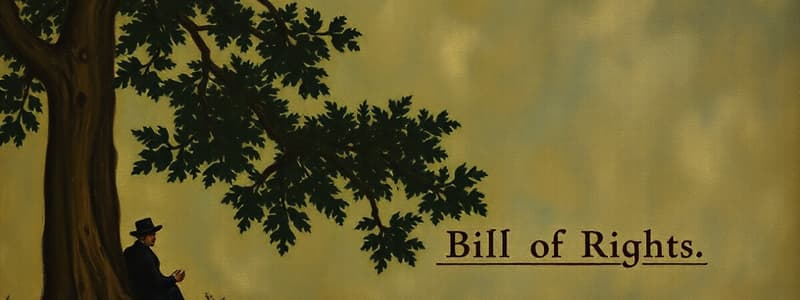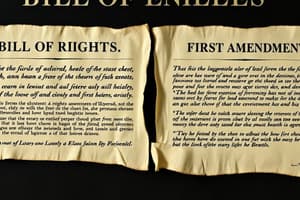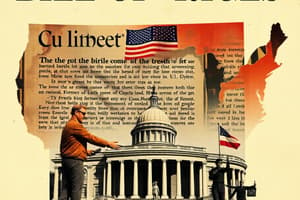Podcast
Questions and Answers
Which of these rights are NOT included in the Bill of Rights?
Which of these rights are NOT included in the Bill of Rights?
- Right to privacy of communication
- Right to bear arms (correct)
- Freedom of Speech
- Right to a fair trial (correct)
The Bill of Rights explicitly guarantees the right to privacy of communication and correspondence.
The Bill of Rights explicitly guarantees the right to privacy of communication and correspondence.
True (A)
What is the legal standard for a valid search warrant?
What is the legal standard for a valid search warrant?
Probable cause
The right to ______ is protected under Section 1 of the Bill of Rights.
The right to ______ is protected under Section 1 of the Bill of Rights.
Match each section of the bill of rights with its corresponding right:
Match each section of the bill of rights with its corresponding right:
Which section of the bill of rights guarantees the right to assemble and petition the government for redress of grievances?
Which section of the bill of rights guarantees the right to assemble and petition the government for redress of grievances?
The Bill of Rights allows for the restriction of the right to travel solely based on the government's discretion.
The Bill of Rights allows for the restriction of the right to travel solely based on the government's discretion.
What is the purpose of Section 9 of the Bill of Rights?
What is the purpose of Section 9 of the Bill of Rights?
Which of the following rights is NOT protected by the Philippine Constitution?
Which of the following rights is NOT protected by the Philippine Constitution?
The Philippine Constitution prohibits the use of torture or any other means that vitiate the free will of a person under investigation.
The Philippine Constitution prohibits the use of torture or any other means that vitiate the free will of a person under investigation.
What type of punishment is prohibited by the Philippine Constitution?
What type of punishment is prohibited by the Philippine Constitution?
According to the Philippine Constitution, excessive ______ shall not be required.
According to the Philippine Constitution, excessive ______ shall not be required.
Under what circumstance is the privilege of the writ of habeas corpus allowed to be suspended?
Under what circumstance is the privilege of the writ of habeas corpus allowed to be suspended?
Match the following Constitutional rights with their corresponding sections:
Match the following Constitutional rights with their corresponding sections:
The Philippine Constitution allows for the death penalty to be imposed for all crimes.
The Philippine Constitution allows for the death penalty to be imposed for all crimes.
No law ______ the obligation of contracts shall be passed.
No law ______ the obligation of contracts shall be passed.
What is the main purpose of the constitutional provision prohibiting ex post facto laws?
What is the main purpose of the constitutional provision prohibiting ex post facto laws?
Which of the following is NOT a right protected under the Philippine Constitution?
Which of the following is NOT a right protected under the Philippine Constitution?
Flashcards
Due Process of Law
Due Process of Law
The legal requirement that ensures fair treatment through the judicial system.
Equal Protection
Equal Protection
Everyone is entitled to equal treatment under the law, without discrimination.
Search Warrant
Search Warrant
A legal document authorizing police to search a specified place.
Privacy of Communication
Privacy of Communication
Signup and view all the flashcards
Freedom of Speech
Freedom of Speech
Signup and view all the flashcards
Free Exercise of Religion
Free Exercise of Religion
Signup and view all the flashcards
Right to Information
Right to Information
Signup and view all the flashcards
Just Compensation
Just Compensation
Signup and view all the flashcards
Contract Obligation
Contract Obligation
Signup and view all the flashcards
Right to Legal Assistance
Right to Legal Assistance
Signup and view all the flashcards
Right to Remain Silent
Right to Remain Silent
Signup and view all the flashcards
Prohibition of Torture
Prohibition of Torture
Signup and view all the flashcards
Right to Bail
Right to Bail
Signup and view all the flashcards
Due Process
Due Process
Signup and view all the flashcards
Presumption of Innocence
Presumption of Innocence
Signup and view all the flashcards
Speedy Trial
Speedy Trial
Signup and view all the flashcards
Protection from Self-Incrimination
Protection from Self-Incrimination
Signup and view all the flashcards
Double Jeopardy
Double Jeopardy
Signup and view all the flashcards
Study Notes
Bill of Rights - Key Rights and Protections
-
Due Process and Equal Protection: No person can be deprived of life, liberty, or property without due process of law, nor denied equal protection under the law.
-
Search and Seizure: People are protected from unreasonable searches and seizures. Warrants must be based on probable cause, determined by a judge, and must specifically describe the place to be searched and items to be seized.
-
Privacy of Communication: Communication and correspondence are protected, except for lawful court orders or when public safety demands it, as established by law. Evidence obtained unlawfully is inadmissible in court.
-
Freedom of Speech, Expression, and Press: Citizens can freely speak, express themselves, and publish information. The right to assemble peacefully and petition the government is also protected.
-
Freedom of Religion: Individuals are free to practice their religion without government interference or discrimination. Religious tests are not permitted for holding civic positions.
-
Liberty of Abode and Travel: People can freely choose their residence and travel, except as limited by law under circumstances of national security, public safety, or public health.
-
Right to Information: The public has a right to information about matters of public concern, including access to government records, documents, and research data.
-
Right to Form Unions and Associations: Citizens can form unions, associations, and societies, as long as their purposes are legal.
-
Protection of Private Property: Private property can't be seized for public use without just compensation.
-
Contract Obligations: No law can impair the force of existing contracts.
-
Legal Assistance and Access to Courts: The courts and quasi-judicial bodies must provide accessible legal aid to individuals, especially the poor.
-
Rights of the Accused: Individuals accused of crimes have rights, including informed consent about remaining silent, assistance of counsel (including a court-appointed one if needed), and the right to a speedy, impartial, and public trial. They are presumed innocent until proven guilty. The accused are also guaranteed the right to confront witnesses and secure evidence for their defense. Trial proceeds even if the accused is absent, but conditions must be met.
-
Habeas Corpus: The right to habeas corpus can only be suspended in cases of invasion or rebellion when public safety requires it.
-
Speedy Trial: People have the right to a speedy resolution of their cases in judicial, quasi-judicial, or administrative bodies.
-
Self-Incrimination: People can't be compelled to be witnesses against themselves.
-
Political Freedom and Involuntary Servitude: Political belief and aspiration can't justify detention. Involuntary servitude is forbidden, except as punishment for a crime.
-
Excessive Fines and Cruel/Degrading Punishment: Excessive punishments like fines or cruel & unusual treatment are banned. The death penalty is possible only for heinous crimes, and existing death sentences are converted to life imprisonment. Degrading treatment of prisoners is prohibited.
-
Imprisonment for Debt: Imprisonment is prohibited for debt or non-payment of poll taxes.
-
Double Jeopardy: Individuals can't be prosecuted twice for the same offense. If the same act violates both a law and an ordinance, a conviction or acquittal under one is a bar to the other.
-
Ex Post Facto and Bills of Attainder: Retroactive laws or laws punishing people without trial are forbidden.
Studying That Suits You
Use AI to generate personalized quizzes and flashcards to suit your learning preferences.




